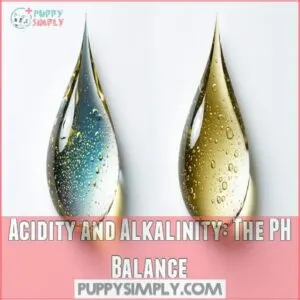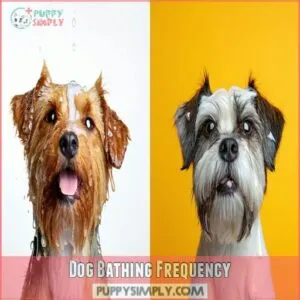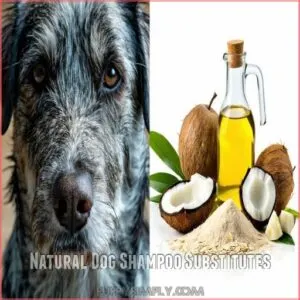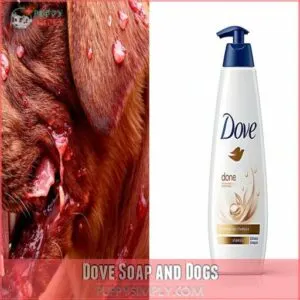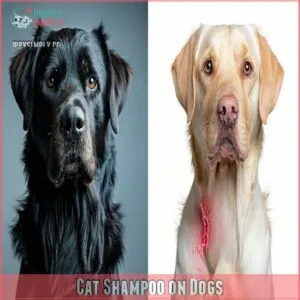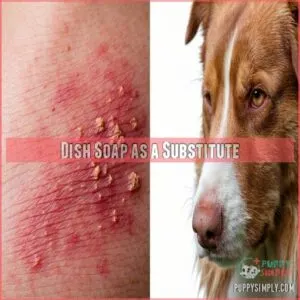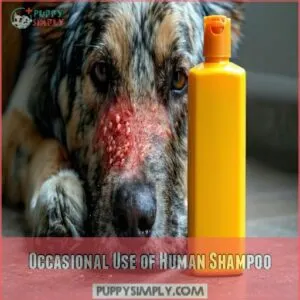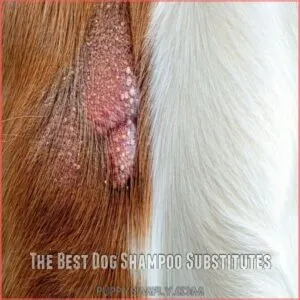This site is supported by our readers. We may earn a commission, at no cost to you, if you purchase through links.

5.5-5.6).
Your dog’s skin also has fewer layers and regenerates faster, making it more vulnerable to harsh chemicals.
While you might be tempted to use your shampoo in a pinch, it can strip away natural oils, cause irritation, and increase infection risks.
In emergencies, unscented baby shampoo is your safest bet – but there’s a whole world of specially formulated options that’ll keep your pup’s coat gleaming. specially formulated options.
Table Of Contents
- Key Takeaways
- Acidity and Alkalinity: The PH Balance
- Who Has More Sensitive Skin?
- Dangers of Human Shampoo on Dogs
- Suitable Human Shampoo for Dogs (Emergency Use Only)
- Types of Dog Shampoo
- Dog Bathing Frequency
- Professional Dog Grooming Services
- Natural Dog Shampoo Substitutes
- Common Myths and Misconceptions
- The Best Dog Shampoo Substitutes
- Frequently Asked Questions (FAQs)
- Is human shampoo bad for dogs?
- Does human shampoo cause dry skin in dogs?
- Is human shampoo good for dogs?
- What happens if a dog ingests human shampoo?
- What is the difference between human shampoo and dog shampoo?
- Why should dogs have their own shampoo?
- What human shampoos are safe for dogs?
- What can I use instead of dog shampoo?
- What can you use to wash a dog?
- Can you use Dove soap on dogs?
- Conclusion
Key Takeaways
- Your dog’s skin has a different pH balance (6.2–7.4) than yours (5.5–5.6) and fewer protective layers, making it more vulnerable to harsh chemicals and irritation.
- When you use human shampoo on your dog, you will strip away their natural oils and disrupt their skin’s protective barrier, increasing their risk of infections and allergic reactions.
- If you are in a pinch, you can use unscented baby shampoo, but you will want to switch to specially formulated dog shampoo as soon as possible to maintain your pet’s skin health.
- You can make safe DIY alternatives by mixing oatmeal with baking soda, using diluted apple cider vinegar, or combining coconut oil with castile soap for a gentle cleanse.
Acidity and Alkalinity: The PH Balance
Ever wondered why your dog’s skin reacts differently to shampoo than yours? It all comes down to pH balance, a key factor in skin health. Your skin maintains an acidic pH between 5.5 and 5.6, while your dog’s skin pH ranges from 6.2 to 7.4, sitting closer to neutral.
For this reason, many pet owners opt for specially formulated acidic shampoo dogs options to address their pet’s unique skin needs. This difference isn’t just a number – it’s essential for protecting against bacteria and maintaining healthy skin. Think of pH balance as your skin’s security system.
Human shampoo is designed for your acidic skin pH, but when used on dogs, it disrupts their acid mantle, their natural protective barrier.
You can actually test this yourself with pH testing strips. While human shampoo typically shows acidic readings around 5.5, dog shampoo readings hover near neutral. That’s why dog shampoos are specifically formulated to match canine skin pH, maintaining their natural defenses against infections and irritations.
Who Has More Sensitive Skin?
Your dog’s skin differs dramatically from yours – they’ve just 3-5 skin layers compared to your 10-15. This thinner structure makes their skin barrier function more vulnerable to damage. Think of it like comparing a cozy sweater to a light t-shirt – one offers way more protection than the other.
Here’s what makes your pup’s skin extra special:
- Their skin cells regenerate every 20 days, while human skin takes about a month
- Dogs lack the thick epidermis that protects human skin from harsh chemicals
- Their skin produces different types of natural oils than humans do
This difference in dog skin sensitivity means they need specially formulated products. When you understand how delicate your furry friend’s skin really is, you’ll see why using the right shampoo matters so much.
Dangers of Human Shampoo on Dogs
Most dog owners don’t realize that grabbing their own shampoo for their pup’s bath can trigger a cascade of skin problems.
Think of your dog’s skin like a delicate ecosystem – it naturally maintains a different pH balance than human skin, typically ranging from 6.2 to 7.4 compared to our acidic 5.5. When you use human shampoo, you’re directly disrupting this balance, stripping away the protective barrier that guards against bacteria and irritants. For a safe alternative, consider using a vet-preferred dog shampoo that addresses specific skin concerns and coat types.
The effects can be immediate and concerning: skin irritation, allergic reactions, and persistent dry skin are just the tip of the iceberg. Your dog’s thinner skin (3-5 layers versus our 10-15) makes them particularly vulnerable to these pH imbalances. Even worse, this disruption increases infection risk, potentially leading to hot spots and persistent itching.
Those harsh sulfates and artificial fragrances in human shampoos? They’re like throwing gasoline on a fire, potentially causing severe reactions in your furry friend’s sensitive skin.
Suitable Human Shampoo for Dogs (Emergency Use Only)
When you’re caught without dog shampoo, three human alternatives can work for emergency washes.
Baby shampoo tops the list as the safest human shampoo for dogs, thanks to its gentle options and minimal additives.
But here’s the catch – even the mildest baby shampoo isn’t a long-term solution for your pup, especially considering the importance of sulfate and paraben-free formulas found in shampoos like Nootie Japanese Cherry Shampoo.
If you must use it, pick unscented versions with safe ingredients and avoid those containing artificial fragrances or dyes that could trigger human shampoo dog allergies.
The key to minimizing risks? Rinsing well – we’re talking twice as long as you think necessary.
Post-wash care matters too; watch for any skin irritation or scratching in the following days.
Remember, this is strictly a one-time solution until you can restock your proper dog shampoo supply.
Types of Dog Shampoo
Now that we’ve covered emergency alternatives, let’s talk about proper dog shampoos that’ll keep your pup’s coat gleaming. Shopping for dog shampoo isn’t just about grabbing whatever’s on sale – it’s about finding the perfect match for your four-legged friend’s unique needs.
Many pet owners also opt for natural remedies like dog itching remedies to help soothe and calm their pup’s skin before even considering a shampoo.
Here’s what’s available in dog shampoos:
- Medicated shampoos pack prescription-strength ingredients to tackle skin infections and persistent itching
- Organic options blend natural ingredients like coconut oil and aloe vera, perfect for environmentally conscious pet parents
- Hypoallergenic formulas provide gentle cleansing for sensitive pups prone to skin reactions
- Oatmeal shampoos soothe irritated skin and reduce inflammation, especially during allergy season
- Puppy shampoos feature ultra-mild ingredients designed for developing skin and coats
Think of dog shampoo as your pup’s personal skin care routine. The right formula maintains that delicate pH balance while addressing specific needs – whether that’s controlling dandruff, managing allergies, or just keeping them fresh between adventures. Unlike human shampoo, these specialized formulas work in harmony with your dog’s natural skin chemistry.
Dog Bathing Frequency
Every dog’s bathing needs are unique, just like their personalities.
Your puppy might need weekly baths during their messy exploration phase, while adult dogs can typically go 2-3 months between washes. Senior dogs often require gentler, more frequent cleaning due to skin sensitivity.
When choosing the right shampoo for your dog’s specific coat type, consult top brands from reliable pet care websites like popular dog shampoo brands. Coat types play a huge role too – your Golden Retriever’s thick fur needs different care than a Chihuahua’s short coat.
Watch for signs like odor or visible dirt, but don’t overdo it – too frequent bathing strips natural oils.
Using human shampoo on dogs disrupts their skin’s balance, so stick to pet-specific products for the perfect bath time routine.
Professional Dog Grooming Services
Professional dog grooming services step up your pet’s care game beyond basic bathing. These trained experts know exactly how to handle your furry friend while providing excellent grooming.
Before booking your appointment, consider these essential aspects of professional grooming, and use online directories to find a "dog grooming near me" that suits your pet’s needs. Grooming costs vary based on breed size, coat condition, and service options – expect to pay $30-100 for a full session Groomer qualifications matter – look for certified professionals with experience in your dog’s breed Post-grooming care instructions help maintain that fresh look between visits Regular appointment scheduling (every 4-8 weeks) keeps your pup’s coat healthy
Professional groomers don’t just bathe dogs – they check skin conditions, trim nails, clean ears, and spot potential health issues early. Their expertise with canine skin care guarantees proper product selection and technique.
Natural Dog Shampoo Substitutes
When your regular dog shampoo runs dry, your kitchen cabinet holds five natural alternatives that are both safe and effective. For more options, check out these dog shampoo alternative product ideas.
These DIY dog shampoo options can be lifesavers in a pinch.
Mix oatmeal with warm water for a soothing bath that calms irritated skin, or create a gentle baking soda paste for deep cleansing.
A diluted apple cider vinegar rinse works wonders for deodorizing, while coconut oil serves as a natural conditioner.
For a complete wash, castile soap diluted with water offers a pH-balanced option that won’t strip your pup’s coat.
| Ingredient | Benefits |
|---|---|
| Coconut Oil | Conditions, repels pests |
| Apple Cider Vinegar | Soothes, deodorizes |
| Lemon Juice | Freshens coat |
| Oatmeal | Calms irritated skin |
| Aloe Vera | Moisturizes, heals wounds |
Common Myths and Misconceptions
You’ll be surprised by how many well-meaning pet owners believe the wrong information about using human shampoo on their dogs.
While you might think that what’s safe for you must be safe for your furry friend, the truth about common bathing substitutes like dish soap, Dove, or cat shampoo will change how you care for your pet’s coat.
Dove Soap and Dogs
Dove soap might seem gentle enough for humans, but it’s a risky choice for your furry friend. Here’s why:
- Contains pH levels too acidic for dog skin
- Includes harsh chemicals that strip natural oils
- Often triggers allergic reactions
- Disrupts your dog’s protective skin barrier
Cat Shampoo on Dogs
Many pet owners think cat shampoo is interchangeable with dog products, but here’s what you need to know. Dogs and cats have different skin chemistry, making cat shampoo potentially harmful for your pup.
| Feature | Cat Shampoo | Dog Impact |
|---|---|---|
| pH Level | More acidic | Can irritate |
| Strength | Too mild | Won’t clean effectively |
| Formula | Cat-specific | May cause reactions |
| Ingredients | Limited | Missing key compounds |
| Protection | Insufficient | Leaves coat vulnerable |
Dish Soap as a Substitute
Desperate times might tempt you to reach for dish soap when your dog needs a bath, but this common household solution poses serious risks. Even Dawn dish soap, though effective for removing oils, can severely dry out your dog’s skin and disrupt their natural pH balance.
- Strips essential protective oils from the coat
- Causes intense skin irritation and redness
- Disrupts beneficial skin bacteria
- Leads to excessive scratching and discomfort
- Increases vulnerability to infections and skin issues
Occasional Use of Human Shampoo
Even one bath with human shampoo can disrupt your dog’s protective skin barrier, leading to dryness, itching, and potential infections. Skip the risk.
The Best Dog Shampoo Substitutes
Running out of dog shampoo doesn’t mean you’re stuck without options. However, some owners might consider using human shampoo, but it’s important to remember that dogs like Pitbulls have single-coated fur, making them prone to dermatitis, dryness, and allergies, which is why they require specialized shampoos.
Your kitchen cupboard might hold the solution to keeping your pup clean and healthy.
Here are some tried-and-true DIY dog shampoo alternatives that won’t disrupt your pet’s delicate skin balance:
- Mix 1 cup oatmeal (ground to powder) with 1/2 cup baking soda and warm water for a gentle, soothing wash
- Combine equal parts apple cider vinegar and water for a natural pest-repelling rinse
- Create a moisturizing blend with 1 cup coconut oil and 1/2 cup castile soap
These safe alternatives work well in a pinch, but remember to spot-test first. Every dog’s skin is different, so what works for one mightn’t suit another. When using these substitutes, rinse thoroughly and watch for any signs of irritation or discomfort.
Frequently Asked Questions (FAQs)
Is human shampoo bad for dogs?
Barking up the wrong tree with human shampoo could harm your dog’s sensitive skin.
Their pH levels differ from ours, and using human products can cause dryness, irritation, and increase infection risk.
Does human shampoo cause dry skin in dogs?
Your dog’s skin can become dry and irritated when you use human shampoo.
Because it’s too acidic for their sensitive skin.
Their pH balance differs from ours, making regular use risky.
Is human shampoo good for dogs?
Holy smokes, no! Don’t use human shampoo on your dog.
It’s too acidic for their skin, which has fewer protective layers than yours.
You’ll disrupt their natural pH balance and risk infections or irritation.
What happens if a dog ingests human shampoo?
If a dog swallows shampoo, they’ll likely experience vomiting and diarrhea.
While small amounts usually aren’t fatal, contact your vet immediately.
The chemicals can cause stomach irritation and potential poisoning.
What is the difference between human shampoo and dog shampoo?
Like night and day, human and dog shampoos differ dramatically in pH levels.
yours is acidic (5-6) while dog products are neutral (2-4) to match their skin needs and protect them.
Why should dogs have their own shampoo?
Your dog’s skin has a different pH level and fewer protective layers than yours.
They’ll need specially formulated shampoo that maintains their natural balance and keeps their coat healthy, preventing irritation and infections.
What human shampoos are safe for dogs?
Despite what some may say, no human shampoo is completely safe for dogs.
Their skin’s pH differs from ours, making even gentle baby shampoos risky.
Stick to specially formulated dog shampoos instead.
What can I use instead of dog shampoo?
Safe alternatives include pet wipes for light cleaning, castile soap, a mixture of baking soda and oatmeal, or a vinegar-water solution. For dry cleaning, cornstarch works well between regular baths.
What can you use to wash a dog?
Like a spa day for your furry friend, you can wash your dog with specialized dog shampoo, gentle oatmeal mixtures, or pet wipes.
For light cleaning, try a vinegar-water solution or cornstarch as dry shampoo.
Can you use Dove soap on dogs?
You shouldn’t use Dove soap on your dog.
It’ll disrupt their skin’s natural pH balance and could cause irritation.
Stick to shampoos made specifically for dogs to keep their coat healthy and comfortable.
Conclusion
Like a protective shield for your pup’s delicate skin, the right shampoo makes all the difference.
Now that you understand why using human shampoo on dogs isn’t worth the risk, you can make informed choices about your pet’s grooming routine.
Remember, your dog’s unique pH balance and sensitive skin deserve special care. Invest in quality dog shampoo, stick to proper bathing schedules, and consult your vet if skin issues arise.
Your four-legged friend’s healthy, glossy coat will thank you.

